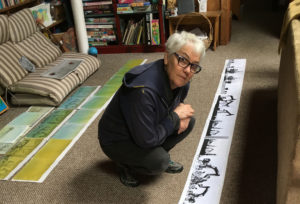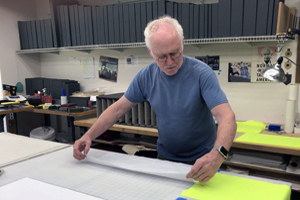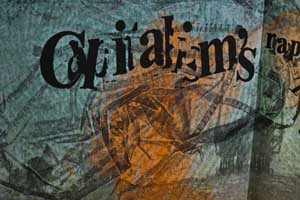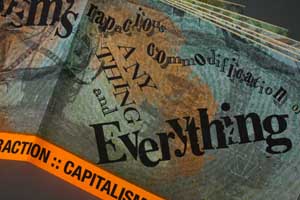Essay by T.J. Demos, “Against Extraction”
Images by Felicia Rice
Publication date: June 1, 2020 (75% of edition destroyed in 8/20 fire)

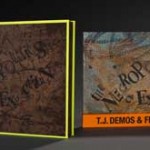
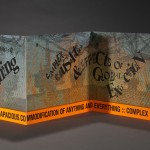

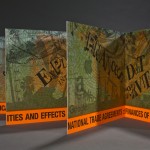
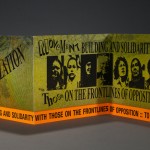
About the book
The Necropolitics of Extraction is a contribution to the CODEX Foundation’s project, EXTRACTION: Art on the Edge of the Abyss. It is the outcome of a collaboration with T.J. Demos, activist and scholar.
In the essay “Against Extraction” that fuels this book, T.J. Demos writes, “Extraction represents the violent transformation of life into capitalist commodities…[It] is a mode of necropolitics: the governance of the dead and dying, including the transformation of habitats into sacrifice zones; the relegation of populations to the worn-out, used-up, and debilitated; the conversion of life-worlds into death-worlds.”
In this accordion-fold book, one long print commenting on the rapacious aspects of extraction resolves in a call to action with Demos’s essay. The print first depicts some of the most pressing problems of our time and then shows the faces of leading social, political, and environmental activists, illustrating Demos’s call to action, “The greatest urgency is to build social movements of mutual aid and collective organizing dedicated to a shared political project of justice and radical equality, on the basis of solidarity—the political form of belonging most opposed to relations of extraction.”
What comes after the end of the world? And how can we cultivate futures of social justice within capitalist ruins? The book closes with the statement: “To make the impossible gradually possible, there is no other choice.” The book describes a closing, but offers an opening as well into an unknown world on the verge of revealing itself through our collective imaginations.
About T.J. Demos
T. J. Demos is an award-winning writer and professor of visual culture at University of California, Santa Cruz, and Director of its Center for Creative Ecologies. He writes widely about contemporary art, global politics, and ecology, and is the author, most recently, of Against the Anthropocene: Visual Culture and Environment Today (Sternberg Press, 2017) and Decolonizing Nature: Contemporary Art and the Politics of Ecology (Sternberg Press, 2016). Demos co-curated Rights of Nature: Art and Ecology in the Americas, at Nottingham Contemporary in January 2015, and organized Specters: A Ciné-Politics of Haunting, at the Reina Sofia Museum in Madrid in 2014. A Getty Research Scholar during Spring 2020, his latest project is Beyond the End of the World, a Mellon-funded research project, art exhibition, film screening series, and book asking how radical cultural practice can transcend catastrophism and negativity, and cultivate futures of social justice and ecological flourishing.
About Felicia Rice and Moving Parts Press
Felicia Rice is a book artist, typographer, letterpress printer, publisher, and educator. In the mid-’70s, while a student of the history of the book and typography, she also learned to handset type, operate old-style letterpresses, and run a hot lead typecasting machine. In 1977 she set Moving Parts Press in motion. With one foot firmly planted in the 19th century and the other in the 21st, she utilizes letterpress and now digital technologies to produce limited edition artists books in collaboration with visual and performing artists, writers, and philosophers. Work from the Press is included in exhibitions and collections widely, both nationally and internationally, and has been the recipient of numerous awards and grants.
Rice writes, “As a printer, my job is to confront complex issues and render my response in book form. As an artist, my job is to do so with profound integrity. As a publisher, my job is to make these issues public. As printers have done every decade since Gutenberg, I’m here to respond to argue for a more just society. It is critical that we do not to remain silent when any living being is attacked, humiliated, or their dignity is harmed. We can speak out as individuals, or better still, we can come together to organize and support one another in taking action to support the dignity of all members of our communities.”
About Craig Jensen of BookLab II
Craig Jensen has been binding Moving Parts Press artists’ books at BookLab II for fifteen years, beginning with Cosmogonie intime in 2005. Moving Parts Press books depend on Jensen’s years of experience and broad knowledge of book structure and housing construction, fine materials, and efficient high quality hand workmanship for their exquisite integrity as book objects. In close collaboration with Jensen, Rice realizes her aesthetic vision to create beautiful books.
About the images
Our culture, our society, is tilting toward the visual, while retaining a place of respect for the written word. The layering of textures and photographic images, overprinted with degraded type, allows for reading both visually and verbally. This satisfies our appetites for the visual and the verbal, and provides multiple entry points for the viewer.
The materials of the clamshell book box reflect our Zoom moment. The cover is a dark, animate rectangle of paper outlined in hi-vis lime, a color that protects against and calls attention to danger, and facilitates communication when we most need it. Opening the box reveals the book with hi-vis orange tape running below the extended images which shouts phrases taken from Demos’s writings, like a chyron beneath the evening news. The stained lines in the crumpled brown paper and the gray smog printed from a rumpled t-shirt hover between the organic and the synthetic.
The prints within each landscape of oil rigs and derricks, mining operations and excavators, and corporate logos overprinted with degraded type suggest a deterioration, the ultimate and inevitable destruction of civilization as we know it. Dry-transfer type, such as Letraset, was popular from the 1960s to the 1980s and revolutionized graphic design. Forty years later my cache of the original material is barely usable as its polymer-based materials have hardened. The cracking lettering references our lack of foresight in developing products that are safe and durable over time. We’re in a free fall, showered with cracking plastic bits.
In the making of fine books we consider the life of the object, using archival materials and techniques to ensure the stable condition of the edition over time. We know from experience that books printed in the 1500s are still with us in remarkable condition, reaching out from over 500 years in the past. Making this type of book is a reaching out to the future, a statement of belief in a future. The thumbprint, tree rings, and spreading oak tree speak to the healing properties of time in the natural world. The blues and grays turn to yellows and greens: from darkness to light, from despair to hope.
About the deluxe edition
Rice has created a deluxe edition of ten unique copies, each one augmented by her original pencil drawings. The atmospherics of each page spread are heightened to bring out the dark and the light aspects of the images moving through the book.
Details
THE NECROPOLITICS OF EXTRACTION
Essay by T.J. Demos
Images by Felicia Rice
9 x 11.5 inches (extends to 17.25 feet)
Forty copies designed in transfer types Letraset Times Bold, Letragraphica, Franklin Gothic, and No. IL4607; Zipatone Emboss Bold; and Formatt No. 5518, No. 5378, No. 5384, No. 5372, and No. 5590; and digital types Helvetica Neue, Janson Text, and Times New Roman.
Printed by Felicia Rice from photopolymer plates on Hosho paper backed with Rives BFK Tan paper. Images created by Rice and printed from photopolymer plates made by Rice and Jonathan Clark of The Artichoke Press. Letterpress and relief printing by Rice using a Vandercook proof press at Moving Parts Press.
Binding by Craig Jensen of BookLab II. Clamshell box covered in cloth and handmade Cave paper.
Edition of 40 signed and numbered copies of which 75% was destroyed in 8/20 fire:
• Standard edition of 30 in cloth and paper covered clamshell box $2500 7 distributed, 23 destroyed in 8/20 fire
• Deluxe edition of 10 with unique drawings by Felicia Rice $3200 3 distributed, 7 destroyed in 8/20 fire
10% of the proceeds from book sales will be donated to support organizations working for environmental justice.
movingpartspress.com/necropolitics-of-extraction




